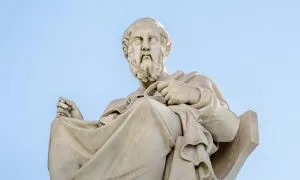 The question is whether democracy will emerge from oligarchic breakdown – or whether the oligarchs will just strengthen their grasp on the levers of government.
The question is whether democracy will emerge from oligarchic breakdown – or whether the oligarchs will just strengthen their grasp on the levers of government.
One of the primary threats to oligarchy was that the oligarchs would become divided, and that one from their number would defect, take leadership of the people, and overthrow the oligarchy.
To prevent this occurrence, ancient Greek elites developed institutions and practices to keep themselves united. Among other things, they passed sumptuary laws, preventing extravagant displays of their wealth that might spark jealously, and they used the secret ballot and consensus building practices to ensure that decisions didn’t lead to greater conflict within their cadre.
Appropriately for a scholar of the classics, Simonton focuses on these specific ancient practices in detail. But his key insight is that elites in power need solidarity if they are to stay in power. Unity might come from personal relationships, trust, voting practices, or – as is more likely in today’s meritocratic era – homogeneity in culture and values from running in the same limited circles.
While the ruling class must remain united for an oligarchy to remain in power, the people must also be divided so they cannot overthrow their oppressors. Oligarchs in ancient Greece thus used a combination of coercion and co-optation to keep democracy at bay. They gave rewards to informants and found pliable citizens to take positions in the government.
In addition, oligarchs controlled public spaces and livelihoods to prevent the people from organizing. They would expel people from town squares: a diffuse population in the countryside would be unable to protest and overthrow government as effectively as a concentrated group in the city.
They also tried to keep ordinary people dependent on individual oligarchs for their economic survival, similar to how mob bosses in the movies have paternalistic relationships in their neighborhoods.
At the same time, they sought to destroy monuments that were symbols of democratic success. Instead of public works projects, dedicated in the name of the people, they relied on what we can think of as philanthropy to sustain their power. Oligarchs would fund the creation of a new building or the beautification of a public space. The result: the people would appreciate elite spending on those projects and the upper class would get their names memorialized for all time. After all, who could be against oligarchs who show such generosity?
Jeffrey Winters’ Oligarchy. Winters argues that the key to oligarchy is that a set of elites have enough material resources to spend on securing their status and interests. He calls this “wealth defense,” and divides it into two categories. “Property defense” involves protecting existing property – in the old days, this meant building castles and walls, today it involves the rule of law. “Income defense” is about protecting earnings; these days, that means advocating for low taxes.
The challenge in seeing how oligarchy works, Winters says, is that we don’t normally think about the realms of politics and economics as fused together. At its core, oligarchy involves concentrating economic power and using it for political purposes. Democracy is vulnerable to oligarchy because democrats focus so much on guaranteeing political equality that they overlook the indirect threat that emerges from economic inequality.
Winters argues that there are four kinds of oligarchies, each of which pursues wealth defense through different institutions. These oligarchies are categorized based on whether the oligarchs rule is personal or collective, and whether the oligarchs use coercion.
Warring oligarchies, like warlords, are personal and armed. Ruling oligarchies like the mafia are collective and armed. In the category of unarmed oligarchies, sultanistic oligarchies (like Suharto’s Indonesia) are governed through personal connections. In civil oligarchies, governance is collective and enforced through laws, rather than by arms.
America is already a civil oligarchy. To use the language of recent political campaigns, our oligarchs try to rig the system to defend their wealth. They focus on lowering taxes and on reducing regulations that protect workers and citizens from corporate wrongdoing.
They build a legal system that is skewed to work in their favor, so that their illegal behavior rarely gets punished. And they sustain all of this through a campaign finance and lobbying system that gives them undue influence over policy. In a civil oligarchy, these actions are sustained not at the barrel of the gun or by the word of one man, but through the rule of law.
If oligarchy works because its leaders institutionalize their power through law, media, and political rituals, what is to be done? How can democracy ever gain the upper hand? Winters notes that political power depends on economic power. This suggests that one solution is creating a more economically equal society.
Leave a Reply